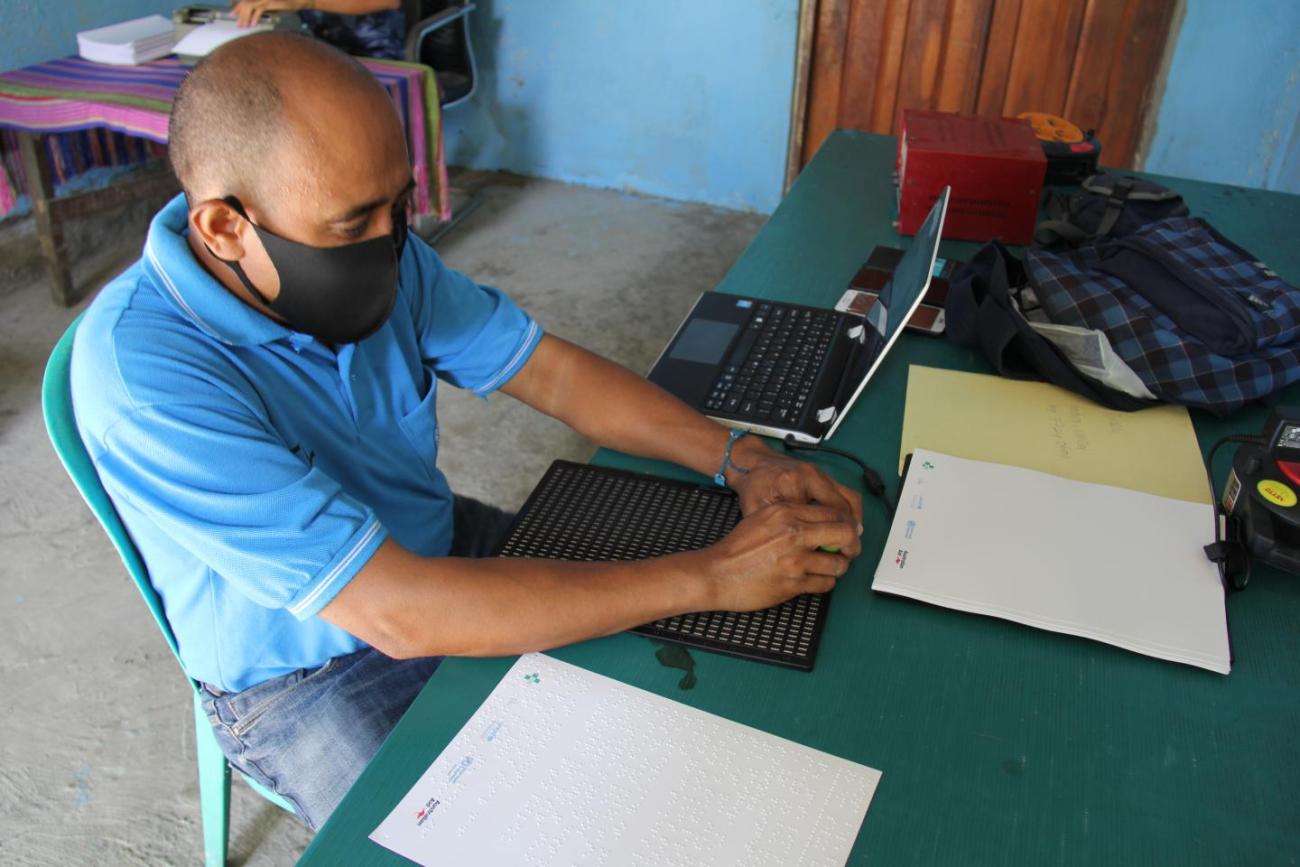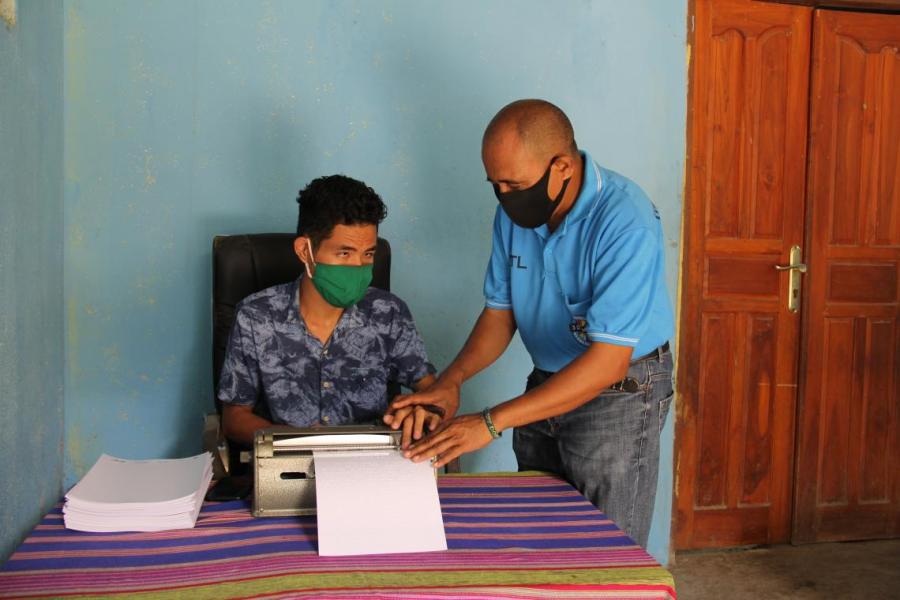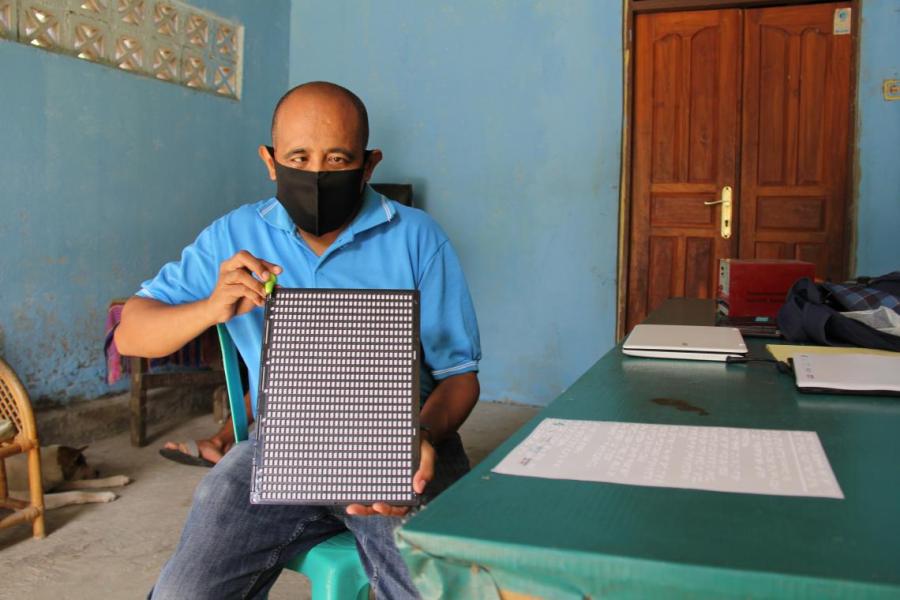Improving access to information for children and people with disabilities in Timor-Leste

Improving access to information for children and people with disabilities in Timor-Leste
With strong partners, UNICEF is developing materials in braille and sign language to ensure children and those with disabilities have key information around COVID-19 prevention
Domingos Savio Fernandes Gusmao is one of 10 siblings. Five of them, including himself, were born blind. He has lived with a disability his entire life, yet Domingos has never faltered in embracing it and using it as a catalyst to improve the lives of others.
“Even living with a condition like this, I can do something good for myself and for others,” he says. “I use my sense of touch to help people.”
Domingos is the President of the East Timor Blind Union (ETBU), an organization that provides education, training and support to people who are blind or vision impaired. He is now also working with the United Nations Children’s Fund (UNICEF) to develop a braille version of COVID-19 prevention messaging, which was developed by the Ministry of Health (MoH), UNICEF, the World Health Organization (WHO) and other partners.
Domingos’s sole assistant, 22-year-old João Martins da Silva, also has a vision impairment. The aim of their braille work, the hardworking duo say, is to help bring information, resources and opportunities to Timorese people, no matter their location or abilities.
The work involves the use of a special typewriter and paper. The two hundred copies of the messages the two are making will be distributed to a number of vision impaired persons. In a day, Domingos and João are able to produce 30 copies of the document, each one taking around 90 minutes to complete.
“As a person with a disability, I am happy to work on braille so that I can improve my skills and be able to become a better braille trainer for others who have a vision problem, especially those who live in rural areas,” says João, who uses a small magnification device known as a loupe to read and see small details.

According to the most recent Population and Housing Census, there are just over 38,000 people in Timor-Leste with a disability, and the most prevalent form of difficulty is with sight, affecting 2.1 per cent of males and 2 per cent of females. The census also revealed that people with a disability, along with young female farmers and adolescent mothers, have poorer education outcomes than others, which can have a lasting impact on a person’s future life. For example, women 15 and above who have a severe disability have an adult literacy rate of 9.5 per cent, well below the 60.2 per cent of women overall.
While opportunities for those living with disabilities in Timor-Leste remain limited, Domingos has seized every one that has come his way. In addition to his braille and ETBU work, he is also an assistant lecturer at the National University of Timor-Leste (UNTL), teaching English to students of political science, a position he has held since 2017. He himself has a postgraduate qualification in Public Administration.
UNICEF’s work with Domingos and João is part of a wider drive to reimagine a more inclusive Timor-Leste, and to ensure that essential information reaches as many people as possible.
“UNICEF aims to ensure all children, including those with disabilities, have access to information and opportunities for learning. Toward this goal, we have forged strong partnerships with organizations and individuals who are also committed to making this a reality,” says Scott Whoolery, UNICEF Timor-Leste’s Deputy Representative. “As important for us as producing various materials are these relationships, so we can continue to work together to advance the rights of every child.”

In support of the response to the COVID-19 pandemic and in association with the Disability Association of Timor-Leste and the MoH, a dedicated video in sign language was produced to share key COVID-19 prevention messages with people who have a hearing impairment. UNICEF also developed a book on COVID-19 and its prevention in a format useful for parents and children with learning difficulties.
As part of the European Union-United Nations Spotlight Initiative, which is aimed at eliminating all forms of violence against women and girls, a series of videos featuring human rights activists, youth advocates and government partners has been created, each complemented by sign language translations. UNICEF is also working with the Disability Association of Timor-Leste to rehabilitate, design and construct disabled-friendly water, sanitation and hygiene facilities in public places and at border areas. UNICEF, alongside UN Women, is also assisting the Ministry of Education, Youth and Sport to develop child functional screening tools that will help to identify students with disabilities that will feed into the country’s Inclusive Education System and the Inclusive Education Resource Center in Dili.
UNICEF Timor-Leste’s work for people with disabilities is supported by the Australian Government’s Department of Foreign Affairs and Trade.
-Ends-





